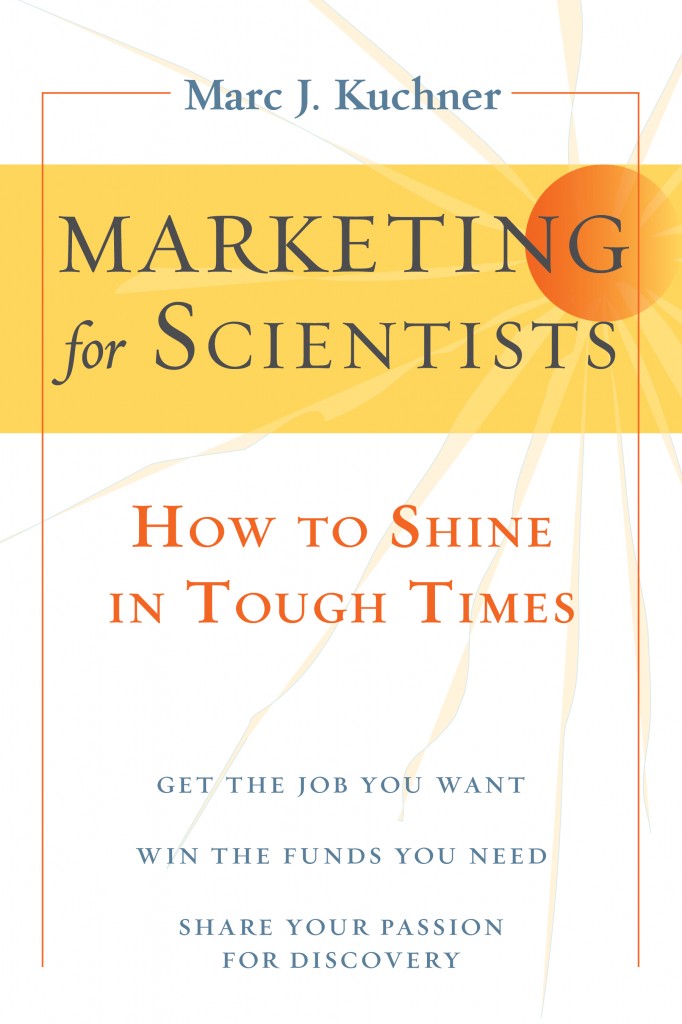Twenty thirteen was another topsy-turvy year for scientists in the U.S. Many of us spent a good part of the year dealing with budgets slashed by sequestration. Government scientists, including last year’s Nobel laureates, spent October 1-16 on furlough. This year’s Nobel laureates were overheard telling their students that they would have better luck building a career if they left the country.

At the same time, 2013 saw shifts in the nature of our marketing tools, as social media outlets edged closer to market saturation. Teens began abandoning Facebook for Instagram, Twitter and Snapchat. Popular Science turned off the comments on its online articles, to combat a “politically motivated, decades-long war on expertise”.
Despite these challenges, scientists kept on keeping on, finding creative new ways to market our work—new insights into our customers and their needs. Here’s a list of my favorite science marketing success stories of 2013. Let’s drink a toast to our colleagues who came up with these plans, and to ourselves for continuing to make new Earth-shattering discoveries this year. Here’s 2012’s list, and 2011’s for comparison.
#5 Shot By Shot: Stories of Vaccine-Preventable Diseases
Sick and tired of misinformed parents and lawmakers who rail against vaccination based on weak, anecdotal evidence? Vaccines protect us from meningitis, polio, and hepatitis, and a range of other horrible diseases; the statistics are clear. But for those who don’t prefer to think about numbers, ShotByShot.org is collecting anecdotes—stories told on video—from people whose lives were changed by horrible vaccine-preventable diseases. In 2013, storytelling remains a crucial marketing tool, and scientists are catching on.
#4 Climate Name Change
Why do terrible hurricanes bear the names of nice people? Glad your name doesn’t happen to be Sandy or Katrina? ClimateNameChange aims to right this wrong, petitioning the World Meteorological Organization to name storms after prominent Climate Change Deniers. Their hysterical, viral video (2.7 million views) shows newscasters tracking hurricanes named for Senators Marco Rubio and David Vitter. Add your signature here to the list of more than 100,000 signatures they have collected so far.
#3 ComSciCon
This new series of workshops, launched by Harvard and MIT graduate students, teaches graduate students to become better communicators. The first ComSciCon, held in June, 2013, focused on writing. The 2014 workshop, June 12th – 14th at the Microsoft New England Research and Development Center focuses on speaking. And get this: the founders scraped up enough funding that workshops are not merely free; they come with travel reimbursement. So there are no excuses not to apply.
#2 The Biotechnology and Life Science Advising (BALSA) Group
Many graduate programs talk about the importance of non-academic career paths. But graduate school remains an ivory tower experience for most. BALSA is working to change that situation in a unique and powerful way. This non-profit organization sends Washington University in St. Louis students and postdocs out into thebusiness community to serve as consultants and gain experience working with local startups. The startups receive help with market analysis, technology due diligence, and other tasks that demand research skills. The students network with industry professionals–and learn to think about Customer Needs and Market Receptivity. Mmm…customer needs!
#1 Citizen Science reaches the White House
 It’s been 114 years since the first Audobon society bird count, and six years since launch of Galaxy Zoo. And now the federal government has come to see the importance of involving laypeople as participants in scientific progress. The new open Govenment action plan, released this December, fosters “incentive prizes, citizen science, and crowdsourcing to harness American ingenuity”. In concert with this plan, the White House recognized twelve leaders of citizen science this June for increasing public engagement in science and science literacy. I think citizen participation in science is an ideal way to heal the rift between scientists and the rest of the country that’s been spreading since World War II. Now that this movement catching on inside the beltway, maybe we’ll see more and more Americans in 2014 getting involved in doing science themselves.
It’s been 114 years since the first Audobon society bird count, and six years since launch of Galaxy Zoo. And now the federal government has come to see the importance of involving laypeople as participants in scientific progress. The new open Govenment action plan, released this December, fosters “incentive prizes, citizen science, and crowdsourcing to harness American ingenuity”. In concert with this plan, the White House recognized twelve leaders of citizen science this June for increasing public engagement in science and science literacy. I think citizen participation in science is an ideal way to heal the rift between scientists and the rest of the country that’s been spreading since World War II. Now that this movement catching on inside the beltway, maybe we’ll see more and more Americans in 2014 getting involved in doing science themselves.

